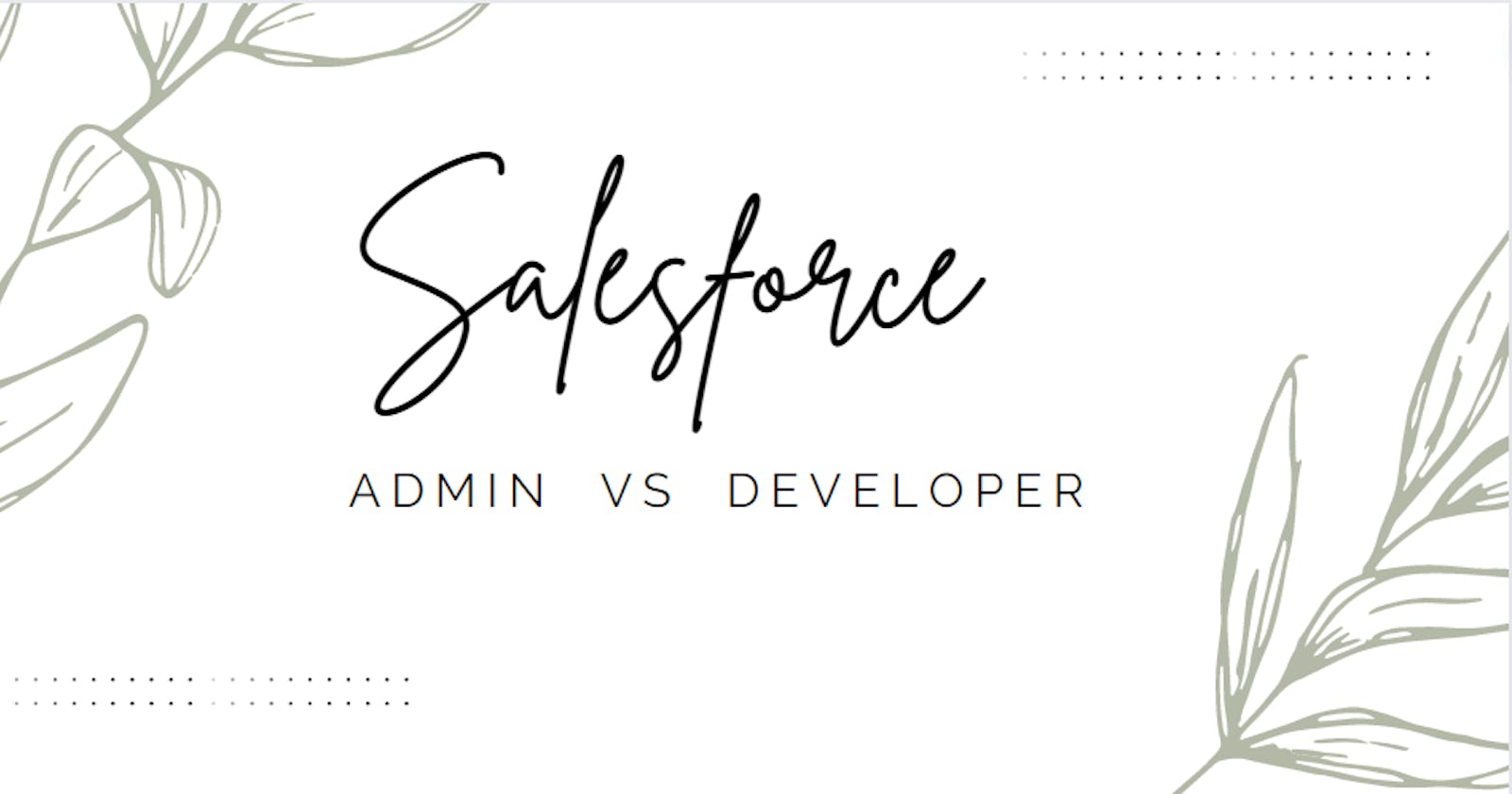Salesforce Admin vs Salesforce Developer: Revealing the Fundamental Contrasts
Understanding the Distinctions: Salesforce Admin vs Salesforce Developer
Introduction
In the realm of Salesforce, two crucial roles stand out: Salesforce Admin and Salesforce Developer. Both positions play vital roles in implementing and maintaining Salesforce solutions, but their responsibilities and skill sets differ significantly. If you're looking to venture into the Salesforce ecosystem or seeking to understand the distinction between these roles, you've come to the right place. In this comprehensive guide, we'll explore the differences between a Salesforce Admin and a Salesforce Developer, shedding light on their unique skill sets, responsibilities, and career paths.
Salesforce Admin vs Salesforce Developer: Understanding the Distinctions
Salesforce Admin: The Master of Configuration
Salesforce Admins are the superheroes responsible for configuring and managing Salesforce instances to meet business requirements. They excel at customizing the platform without requiring extensive coding knowledge, thanks to Salesforce's declarative features. Here's what sets Salesforce Admins apart:
Role and Responsibilities of a Salesforce Admin
A Salesforce Admin's primary role is to maintain and optimize Salesforce for their organization. Their responsibilities include:
Configuring and customizing Salesforce to align with business processes.
Managing user access and security settings.
Creating and maintaining reports and dashboards.
Assisting users with troubleshooting and support.
Collaborating with stakeholders to gather requirements and implement solutions.
Training users on Salesforce functionalities.
Staying updated with Salesforce releases and new features.
Skill Set Required for a Salesforce Admin
Salesforce Admins need a unique set of skills to excel in their role:
Proficiency in Salesforce administration and configuration.
Strong analytical and problem-solving skills.
Excellent communication and collaboration abilities.
Knowledge of data management and reporting.
Understanding of business processes and requirements.
Familiarity with Salesforce best practices and security guidelines.
Career Path for a Salesforce Admin
Salesforce Admins have various career growth opportunities:
Advanced Administrator: Acquiring advanced certifications and specializing in specific Salesforce functionalities.
Consultant: Leveraging their expertise to provide consulting services to organizations.
Solution Architect: Expanding their skills to design and architect complex Salesforce solutions.
Salesforce Admin Manager: Taking on managerial roles, leading a team of Salesforce Admins.
Salesforce Developer: The Wizard of Code
Salesforce Developers are the architects who transform business requirements into robust, customized solutions using code. They possess coding skills and utilize Salesforce's development tools to create intricate applications. Let's delve into the world of Salesforce Developers:
Role and Responsibilities of a Salesforce Developer
Salesforce Developers are responsible for building, customizing, and integrating Salesforce applications. Their key responsibilities include:
Developing and implementing custom functionalities using Apex and Visualforce.
Creating triggers, classes, and components to enhance Salesforce capabilities.
Integrating Salesforce with external systems using APIs.
Optimizing and maintaining existing code.
Collaborating with stakeholders to gather technical requirements.
Troubleshooting and debugging code-related issues.
Staying updated with Salesforce development best practices.
Skill Set Required for a Salesforce Developer
Salesforce Developers need a specialized skill set to excel in their role:
Proficiency in Apex, Visualforce, and other Salesforce development languages.
Strong understanding of object-oriented programming.
Knowledge of web technologies like HTML, CSS, and JavaScript.
Experience with Salesforce APIs and integration techniques.
Problem-solving and debugging skills.
Familiarity with version control systems and development methodologies.
Career Path for a Salesforce Developer
Salesforce Developers have numerous avenues for career advancement:
Senior Developer: Gaining expertise in Salesforce development and taking on more complex projects.
Technical Architect: Leading the design and implementation of enterprise-level Salesforce solutions.
Development Team Lead: Managing a team of Salesforce Developers and guiding their projects.
Solution Architect: Expanding knowledge beyond development to architect end-to-end solutions.
Frequently Asked Questions (FAQs)
Q: What are the key differences between a Salesforce Admin and a Salesforce Developer?
A: The key differences lie in their roles and responsibilities. Salesforce Admins focus on configuration, customization, and user support, while Salesforce Developers specialize in coding, application development, and integration.
Q: Can a Salesforce Admin become a Salesforce Developer?
A: Yes, it is possible for a Salesforce Admin to transition into a Salesforce Developer role. However, it requires acquiring coding skills and extensive training in Salesforce development languages.
Q: Is coding knowledge necessary for a Salesforce Admin?
A: While coding knowledge is not a prerequisite for Salesforce Admins, having a basic understanding of Salesforce development languages can be advantageous for customizing and troubleshooting certain functionalities.
Q: Which role is more in demand: Salesforce Admin or Salesforce Developer?
A: The demand for both roles is substantial. However, the demand for Salesforce Developers tends to be higher due to the growing need for custom development and integrations.
Q: Can a Salesforce Developer perform the tasks of a Salesforce Admin?
A: Salesforce Developers can handle some administrative tasks, but their primary focus is on coding and development. For comprehensive administrative functions, it is advisable to have a dedicated Salesforce Admin.
Q: Do Salesforce Admins and Salesforce Developers work together?
A: Absolutely! Salesforce Admins and Salesforce Developers often collaborate closely on projects. Admins communicate requirements to Developers, who then implement the necessary customizations and functionalities.
Conclusion
In the realm of Salesforce, both Salesforce Admins and Salesforce Developers play critical roles in creating and maintaining successful Salesforce implementations. While Salesforce Admins focus on configuration, customization, and user support, Salesforce Developers utilize their coding expertise to build tailored applications and integrations. Understanding the distinctions between these roles is vital for organizations and individuals looking to embark on a Salesforce career path. Whether you're drawn to the declarative power of configuration or the artistry of coding, the world of Salesforce offers abundant opportunities for growth and success.
